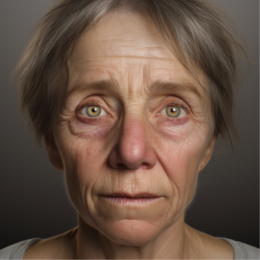Unveiling the Mystery: What Are the Symptoms of Rheumatoid Arthritis?

Rheumatoid arthritis (RA) is a complex and often debilitating autoimmune disease that affects millions of people worldwide. Recognizing its early symptoms is crucial for timely diagnosis and intervention. In this article, we will explore the common indicators and warning signs of rheumatoid arthritis, providing valuable insights into understanding this challenging condition. Also, we will tell you Jane’s story, which will help us relate to the subject on a more personal level. Stay tuned for her story.
What Is Rheumatoid Arthritis?
Rheumatoid arthritis, or simply RA, is a chronic autoimmune disease that affects approximately 1.3 million people in the United States alone, according to the latest statistics. It’s characterized by the immune system mistakenly attacking the synovium, the lining of the membranes that surround the joints. This attack can lead to inflammation, joint damage, and a host of uncomfortable symptoms.
Statistics:
- 1.3 million Americans are currently living with rheumatoid arthritis.
How Rheumatoid Arthritis Is Diagnosed?
If you or someone you know is experiencing joint pain or stiffness, it’s essential to understand how RA is diagnosed. Early diagnosis is crucial for effective management. Doctors typically rely on a combination of medical history, physical exams, blood tests, and imaging studies to diagnose RA accurately.

Meet Jane
Jane, a 32-year-old woman, recently visited her doctor after experiencing persistent joint pain and fatigue. Her story closely mirrors the experiences of many RA patients. The doctor diagnosed her with rheumatoid arthritis, and Jane’s journey toward understanding her condition began.
What Are the Symptoms of Rheumatoid Arthritis?
Now, let’s get to the heart of the matter – the symptoms of rheumatoid arthritis. RA doesn’t discriminate; it can affect people of all ages and backgrounds. The symptoms can vary from person to person, but some common ones include:
- Joint pain and stiffness, often in multiple joints.
- Fatigue and weakness.
- Swelling and tenderness in affected joints.
- Morning stiffness that lasts for hours.
- Reduced range of motion in the affected joints.
- Rheumatoid nodules (lumps under the skin).
- Fever and loss of appetite.
Quick Poll
Causes of Rheumatoid Arthritis
- Genetic Predisposition: Genetics plays a significant role in the development of RA. If you have a family history of the disease, your risk of developing it may be higher. Researchers have identified specific genetic markers, such as the HLA-DR4 gene, which are more commonly found in people with rheumatoid arthritis.
- Environmental Triggers: While genetics may load the gun, so to speak, environmental factors can pull the trigger. Various environmental triggers have been linked to the onset of RA. These triggers may include infections, such as viral or bacterial infections, which can activate the immune system and lead to the development of autoimmune diseases like RA.
- Gender and Hormones: RA is more common in women than in men, with about 75% of those affected being female. Hormonal factors, such as changes in estrogen levels during pregnancy or menopause, may influence the development or severity of RA. This gender disparity suggests a complex interplay between hormones and the immune system.
- Smoking: Smoking is a well-established environmental risk factor for rheumatoid arthritis. Studies have shown that individuals who smoke are more likely to develop RA, and smoking can also make the disease more severe. Quitting smoking may reduce the risk and improve outcomes for those with RA.
- Microbiome and Gut Health: Emerging research is exploring the connection between the gut microbiome and autoimmune diseases, including RA. An imbalance in the gut flora may contribute to the development of RA. Maintaining a healthy gut through a balanced diet rich in fiber and probiotics may help reduce the risk.
- Occupational Exposures: Some occupational exposures to certain chemicals and dust may be associated with an increased risk of RA. For example, silica dust, found in mining and construction industries, has been linked to a higher risk of developing RA. Occupational safety measures can help mitigate these risks.
- Obesity: Carrying excess weight places additional stress on the joints, particularly those in the lower body. Obesity is considered a modifiable risk factor for RA, and losing weight through diet and exercise may help reduce the risk and alleviate symptoms in those already diagnosed.
Statistics:
- RA is more common in women, with about 75% of those affected being female.
How to Treat Rheumatoid Arthritis
Managing rheumatoid arthritis is a collaborative effort between patients and healthcare professionals. The goal is to reduce inflammation, relieve pain, and preserve joint function. Treatment options may include:
- Medications, such as disease-modifying antirheumatic drugs (DMARDs).
- Physical therapy to improve joint function and reduce pain.
- Lifestyle changes include regular exercise and a balanced diet.
- Surgery in severe cases to repair or replace damaged joints.
Prevention of Rheumatoid Arthritis
While we can’t completely prevent rheumatoid arthritis, certain lifestyle choices may reduce the risk or delay its onset. Here are some tips to consider:
- Maintain a healthy weight to reduce the stress on your joints.
- Don’t smoke – smoking is associated with a higher risk of RA.
- Eat a diet rich in antioxidants and anti-inflammatory foods.
- Stay physically active to keep your joints flexible and strong.
- Manage stress through relaxation techniques and mindfulness.
Conclusion
Rheumatoid arthritis (RA) is a challenging autoimmune disease that affects millions globally. It’s a condition that doesn’t discriminate based on age or background, manifesting in various ways, including joint pain, fatigue, and swelling. Understanding its symptoms, diagnosis, and treatment options is essential for those affected and their loved ones.
PLEASE SHARE YOUR EXPERIENCE AND THE COMMENTS BELOW, SO WE CAN HELP EACH OTHER WITH THE KNOWLEDGE YOU HAVE GAINED.
References
- Arthritis Foundation. (n.d.). Rheumatoid Arthritis. https://www.arthritis.org/diseases/rheumatoid-arthritis
- Mayo Clinic. (2021). Rheumatoid arthritis. https://www.mayoclinic.org/diseases-conditions/rheumatoid-arthritis/symptoms-causes/syc-20353648





